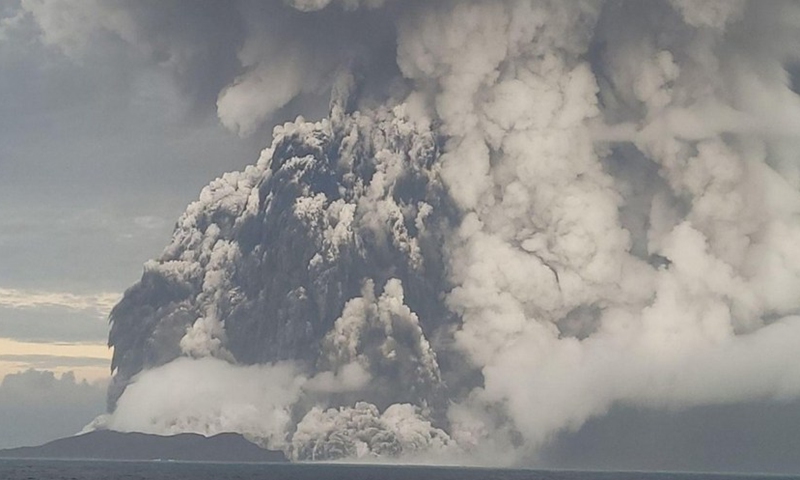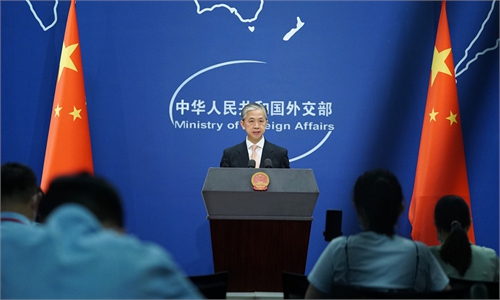Tonga volcanic eruption unlikely to significantly affect climate or overwhelm long-term global warming trend: study

Photo taken on Jan.14, 2022 shows the eruption of Hunga Tonga-Hunga Ha'apai volcano in Tonga.(Photo Tonga Geological Services of the Government of Tonga/Xinhua)
A group of Chinese scientists concluded that the eruption of the Tonga volcano will not be strong enough to significantly affect the global climate or overwhelm the long-term global warming trend, based on their fresh analysis of the possible cooling effect of the sulfur dioxide injected into the atmosphere by the volcano eruption in January.
The analysis, conducted by scientists from the Chinese Academy of Sciences, Nanjing Normal University, Sun Yat-Sen University and Zhejiang University, was published in the journal Advances in Atmospheric Sciences on Tuesday.
Sulfur dioxide injected into the stratosphere after a volcanic eruption is oxidized and converted to sulfate aerosols, which linger for one or two years. The impact to climate is most evident in the first or two years after volcanic eruption, Zhou Tianjun, corresponding author of the analysis and a scientist at the Institute of Atmospheric Physics in the Chinese Academy of Sciences, told the Global Times on Tuesday.
Zhou noted that the aerosols can reduce the incoming solar radiation to result in a short period of global cooling. The magnitude is however dependent on the intensity of the volcano eruption.
According to Zhou, the largest volcanic eruption of the last 500 years, the eruption of Mount Tambora in Indonesia in April 1815, caused the so-called "year without a summer" in the following year in many parts of the world. There was a reduction in annual mean surface temperature over the tropics and northern hemisphere by 0.4-0.8 C, and the Tambora eruption emitted 53-58 terrograms of sulfur dioxide.
But satellite measurements of the eruption at Hunga Tonga-Hunga Ha'apai — which has erupted multiple times over the past century — showed that its volcanic ash has reached an altitude of 30 kilometers into the stratosphere, with a total mass of only about 0.4 terrogram.
Based on climate-model simulations that use large southern hemisphere volcanic eruptions in the last millennium, scientists found a significant correlation between the intensity of 70 selected volcanic eruptions over the last millennium and the global mean surface temperature response in the first year after eruption.
Based on this relationship, they can estimate the climate impact of the current Hunga Tonga-Hunga Ha'apai volcanic eruption by using a pattern scaling technique. The final results showed that that the global mean surface temperature will decrease by only 0.004C in the first year after the Tonga volcanic eruption. This is within the scope of internal variability of the climate system, Zhou said.
The cooling in the southern hemisphere will be stronger than in other parts of the world, with the strongest cooling of more than 0.01 C occurring in parts of Australia and South America. The cooling over most of China will be less than 0.01 C, Zhou said.
He said this means that the eruption of the Tonga volcano will not be strong enough to overwhelm the long-term global warming trend. Although so far the Tonga volcanic eruption is unlikely to affect climate, large volcanos are typical "low-likelihood but high-impact" events. Zhou called on countries to enhance their emergency management systems to timely send alert and prepare for large volcanic eruptions and a possible climate impact.




